By: Lynn Barker
In Battle of the Sexes, it’s 1973 and the battle for female equality is raging. It is still thought that female sports figures would never be equal to men in respect or in pay. When women’s tennis champ Billie Jean King agreed to play a match against male tennis figure Bobby Riggs, everyone eagerly watched her win. So much was on the line.
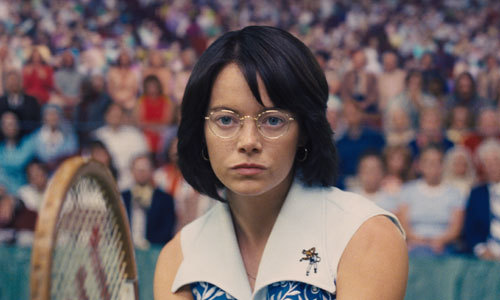 Billie (Emma) during the matchCourtesy of Fox Searchlight
Billie (Emma) during the matchCourtesy of Fox Searchlight
Playing Billie Jean was challenging for popular actress Emma Stone who became friends with the real Billie Jean and who admits that she had to bulk up and take a crash course in tennis that made her feel “empowered”. Check it out!
Q: Emma it must be so exciting to take on a role like this where you have access to the person that you’re playing but you might not want to spend too much time with her so you don’t risk doing an impersonation. How did you handle that?
- Emma: I had never really played a real person before much less someone like Billie Jean so I wasn’t sure what my process was going to need to be. So, when I met her, she was so wonderful and she and her partner Ilana were so welcoming to me.
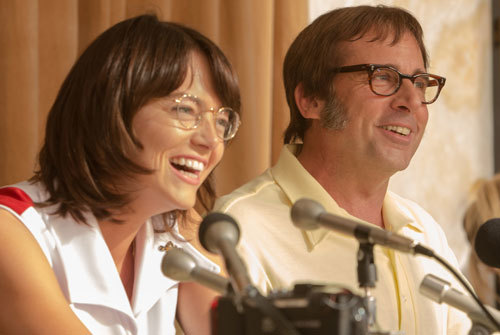 Emma as Billie Jean with Steve Carell as Bobby RiggsCourtesy of Fox Searchlight
Emma as Billie Jean with Steve Carell as Bobby RiggsCourtesy of Fox Searchlight
Q: Did she help you with your tennis or forming your portrayal of her?
- Emma: Billie made it clear early on that she would be open to whatever process we needed to go through in order to bring this whole thing to fruition so we threw some balls around on a tennis court and I quickly realized that I wanted to watch a lot of footage from her time period and read a lot about her then because she is so fully formed now and more able to talk about this with closure and hindsight than at age 29. So, I ended up just doing a lot of research on her in that very specific timeframe.
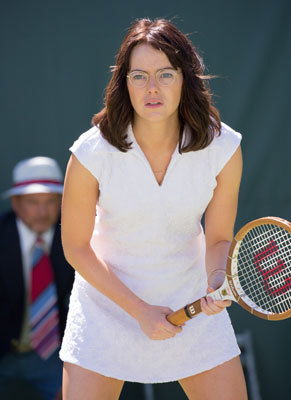 Determined to winCourtesy of Fox Searchlight
Determined to winCourtesy of Fox Searchlight
Q: Did you see the footage of Sloane Stephens who won the U.S. Open singles when she got presented her check for 3.7 million dollars on the court after she won? What’s it like for you to hear now that the winner of the U.S. Open female makes 3.7 million dollars?
- Emma: I was at the U.S. Open with Billie Jean King watching that moment so it was pretty unbelievable and, as Billie Jean has said, this was what she and these women in the original nine (female players) were fighting for. They were fighting for the next generation and onward to have moments like that. I can only imagine what it feels like for Billie Jean to watch this young girl who has just won the U.S. Open get presented with 3.7 million dollars. It’s got to be incredible.
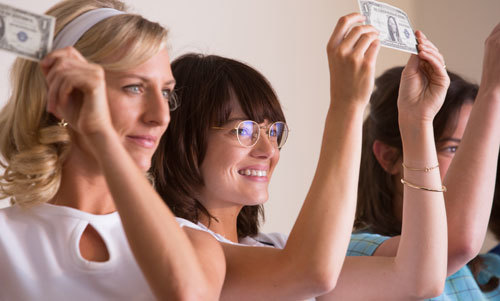 Making a point about equal payCourtesy of Fox Searchlight
Making a point about equal payCourtesy of Fox Searchlight
Q: In the film, after the match, Billie Jean is back in the locker room crying. It seems that there are a couple of things going through her mind at that point: She can’t be who she is (gay) in public and she has to be an example for women at that time. How was playing that scene?
- Emma: I was thinking about that moment in all other scenes of the film because she has such strength and she holds it together and it’s all just right under the surface for most of the film. That sort of breaking point, she gets to earn that moment because she was on four hours of sleep every night and all of this was going on (in her personal life). In that moment, after winning, it was pivotal to me as an actor to know this is where we were building to.
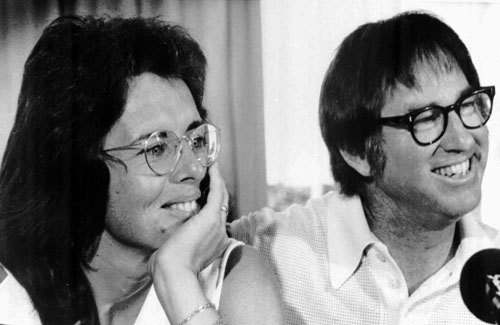 The real Billie Jean with Bobby RiggsCourtesy of Fox Searchlight
The real Billie Jean with Bobby RiggsCourtesy of Fox Searchlight
Q: You’ve said you wanted to do right by Billie Jean King and it’s a marvelous performance but you’re not a tennis pro. Was that the most difficult thing to make real for this movie?
- Emma: I had never played tennis. I’m not particularly good at tennis. I had a lot of lessons but I also had an incredible professional double who was phenomenal and I had an amazing coach and a great trainer that was bulking me up and I had Billie Jean throwing balls at me and letting me mirror her and figure out all the details. I was surrounded by a team of massive support when it came to that element because so much of the story is about her personal journey and struggle but if this had been the Billie Jean tennis movie, I never would have gotten the part. I had such an incredible team. They made it possible.
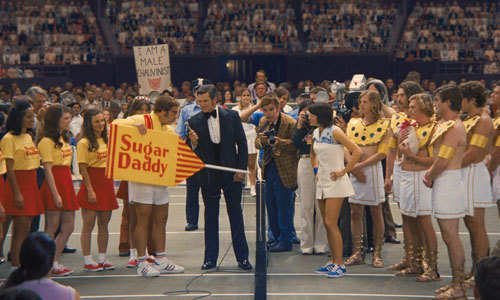 Crazy publicity stunt for the matchCourtesy of Fox Searchlight
Crazy publicity stunt for the matchCourtesy of Fox Searchlight
Q: So was that the biggest hurdle and how long were you preparing before filming?
- Emma: It was a big hurdle but we were also able very early on to realize where my strengths would be and what we could use. I was a novice tennis player trying to become number one in the world in three months (laughter). How can we make this work on a wooden racquet? So early on we could gauge that these shots would be like this or we’re going to learn the choreography of this. We can do a lot now. There’s a lot of magic out there (laughter). You can seem like a superhero. So we kind of figured out as we were going the choreography of it and that made it possible.
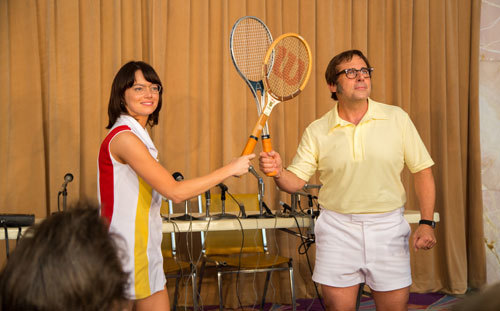 The champs announce their match to the worldCourtesy of Fox Searchlight
The champs announce their match to the worldCourtesy of Fox Searchlight
Q: I heard that you put on some muscle for this part. How did that effect you and your body and performance?
- Emma: It was amazing. I’d never played an athlete before and I’d never been athletic before really. I had danced obviously (in La La Land) and that’s athletic but in a different way than a weightlifting tennis player. So, the beginning of the process was pretty brutal but then you get into a place that’s so amazing and you start to understand the mind of someone who is strong enough to execute whatever it is they want to execute. If I want to put the ball over there, I can do it. I have the strength. I want to lift this up, I can do it.
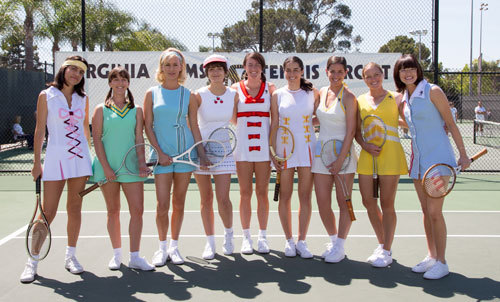 The nine women champs of the time with Emma as Billie on rightCourtesy of Fox Searchlight
The nine women champs of the time with Emma as Billie on rightCourtesy of Fox Searchlight
Q: Did you use your newfound strength in your personal life?
- Emma: I remember that dogs have like 60 pound food bags and I was like (lifting) “I got it”. It was the most empowering feeling.
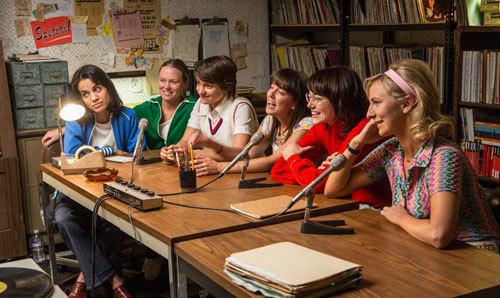 Publicizing women's tennisCourtesy of Fox Searchlight
Publicizing women's tennisCourtesy of Fox Searchlight
Q: How did you see Billie Jean as a person?
- Emma: I thought Billie Jean is a social activist. She was always wired for social change from a young age when everyone was white, (women wore) gloves that were white, the tennis balls were white, everything and she realized that from the very beginning but she also realized she was great at tennis and this was going to be an amazing platform for her. She could be the best to change the world. So physicality is everything to do with that. If you have the strength to be the best in tennis, you can change the world so that was an amazing place to get to; to understand that physical strength equals strength out in our country or in the conversation to further equality. I know that sounds a little crazy but I did start to put those pieces together and it was super empowering. It felt so good.
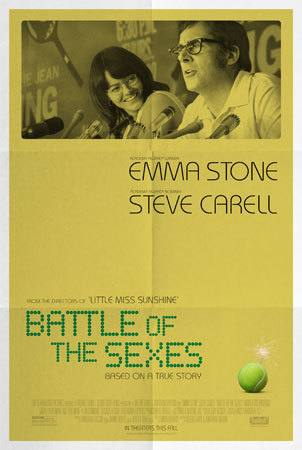 Battle of the Sexes PosterCourtesy of Fox Searchlight
Battle of the Sexes PosterCourtesy of Fox Searchlight
See Battle of the Sexes in theaters now!
Have Your Say
Do you think female sports figures should make the same money as males? Do you feel gratitude to the female athletes of the past who make this closer to reality? Talk tennis and more below with a comment.

































